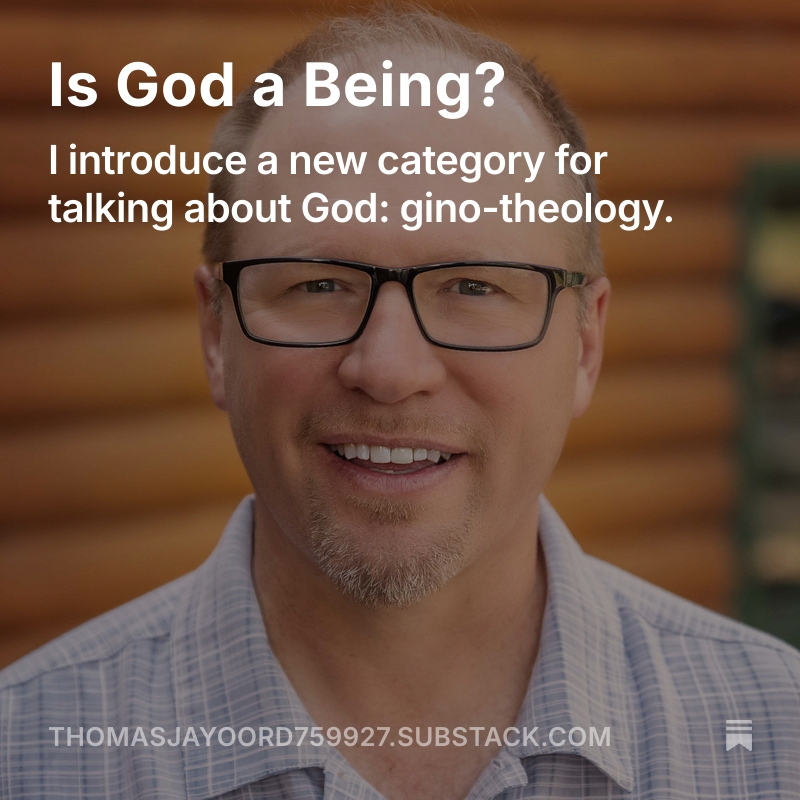Introducing Gino-Theology
In a recently published Substack essay, I looked at arguments for and against saying God is a being. I propose a new way to think about God I call “gino-theology.”
In that Substack essay, I argued that we best think of God as an everlastingly becoming Spirit. That’s gino-theology. By “becoming,” I mean the Spirit is an experiencing, dynamic Person who engages in moment-by-moment relations with creatures and creation. A becoming Spirit is really, not symbolically, a living deity. God moves relationally through time and enjoys new experiences.
By “becoming,” I don’t mean God is not yet present. I don’t mean God only exists at some later time. Nor do I mean God is half-baked, partly alive, or less than fully divine. The becoming Spirit doesn’t reside in the future rather than the present, and She is not voluntarily hiding. God’s “godness” is complete, in the sense that the divine essence is unchanging.
“Becoming” describes God’s eventful and experiential living as a divine Subject in relation with creatures.
God has an everlastingly unchanging essence but everlastingly changing experiences. The Spirit’s everlasting characteristics and traits pass on moment by moment. They make up the unchanging divine attributes and essence. The universal Spirit who loves, therefore, is an everlasting series of divine moments of changing experiences with continuity that derives from God’s unchanging nature.
Gino-Theology
I adopt an ontology of becoming, in part, because existing is better understood as experiential, relational, and dynamic. I also adopt an ontology of becoming to ground language about God in categories that apply also to creatures. The Spirit and creatures must share at least the categories pertaining to acting, relating, perceiving, and loving if what we say about God can make sense.
To distinguish the philosophy of becoming I advocate from onto-theologies I reject, I propose a new label for theologies that see God as dynamic. That label is ‘gino-theology.’ It draws from the Greek word for ‘becoming’ — Ginomai (γινομαι) — which describes a happening, an event, occurrence, or a coming to be. (The “G” in the word is hard rather than soft, the ‘I’ is short, and ‘no’ sounds like ‘know.’)
Gino-theology is, therefore, a theology of God’s becoming.
Gino-theology points to the categories of becoming to account for the dynamism of God. The becoming Spirit who loves is an everlasting series of personally-ordered divine occasions. Gino-theology draws from categories that apply to Creator and creatures. Divine becoming is like creaturely becoming, for instance, insofar as both Creator and creatures are eventful actors, feelers, thinkers, and relaters. Divine becoming differs, however, insofar as the Spirit is all-pervading, everlasting, perfectly wise, all-feeling, and so on. God can be only one of a genus (sui generis), while sharing similarities with other genera.
Gino-Theology Movements
Various theological movements fit the framework gino-theology. Those movements include open and relational theologies of various types, including process, relational, openness, and similar theologies. Such traditions argue that God is relational and changes in some ways. They’re known for emphasizing God as experiential, time-oriented, personal, emotional, receptive, dynamic, and loving. But other theologians and theological movements also align with gino-theology.
Christians influenced by the Eastern church, for instance, have the language to talk about God as relational becoming. Many refer to the Spirit’s activity as ‘divine energies’ (energia) which conveys the dynamism appropriate for love. Unfortunately, ‘energies’ can be interpreted as power units external or internal to God, however, rather than the Spirit’s own becoming. ‘Ginomai,’ I submit, better accounts for the Spirit’s becoming than ‘energies.’
Most personalist theologies are part of the gino-theology family. Personalists like Borden Parker Bowne, Edgar Brightman, Georgia Harkness, and Martin Luther King, Jr., build from the primary claim that God is a divine person relating with creaturely persons. God has intelligence, acts, relates, responds, learns, and more as a dynamic agent. While personalists may not use the word ‘becoming,’ their theology assumes it.
Some of what Karl Barth says aligns with gino-theology. Barth argued for divine becoming to emphasize the dynamism of the Word. “We speak of an action, of a deed, when we speak of the being of God as a happening,” Barth says. “God’s being proceeds,” he says, by actively self-revealing in history. His claim that ”God’s being is event” mirrors gino-theology, and Eberhard Jungel concludes that in Barth’s theology, “God’s being is in becoming.
In his radical theology, John Caputo embraces the gino-theology notion of God as event. This way of talking fits the movement of differance articulated by Jacques Derrida. Caputo refers to the Spirit as event partly because it undermines onto-theology. But to my knowledge, he does not explore the notion of God as a series of events. The dynamism Caputo rightly sees in differance could be understood as the Spirit’s ongoing, eventful becoming.
Conclusion
In sum, the becoming Spirit loves moment by moment in ongoing living. Rather than an unchanging being, being itself, or without being, the Spirit is best understood as an always becoming but universal agent. And gino-theology replaces onto-theology. A theology of the becoming Spirit better reflects the scriptural witness, aligns with lived experience, and better supports the primacy of love.
For more details, see the full Substack article.

(Click on photo to connect with Substack)

Comments